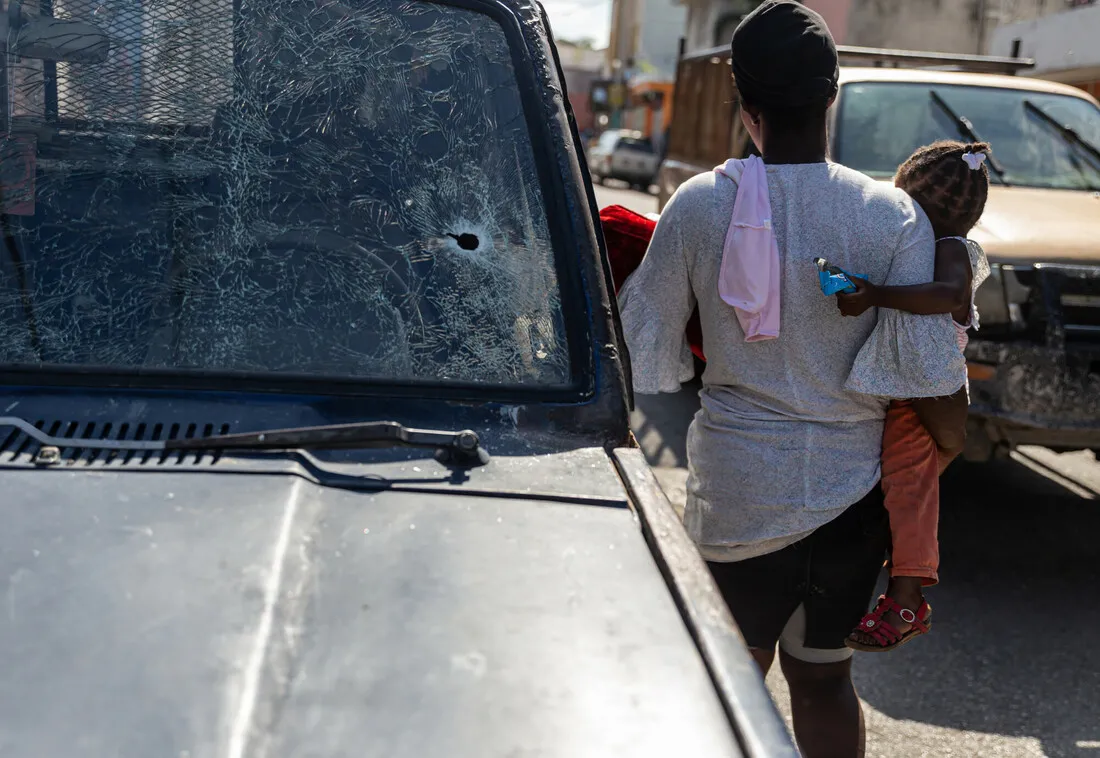And in the outlying regions they cannot transport their goods to sell to Port au Prince.
Our purchasing power has decreased tremendously. Then using technology, using the WhatsApp network, is not easy because the network doesn’t work when there is no electricity.
What is the situation like right now for displaced people? What are you seeing at the sites?
Most of them are in dangerous areas. So usually, the families go to schools, as well as government buildings, or sometimes churches. But this infrastructure was not built to accommodate families, to accommodate girls, to accommodate children, to accommodate mothers. You see all the families in the same room, in the same yard, all together. One sanitary block for everybody. The showers are for everybody.
In terms of basic needs, there’s not enough potable water. Sometimes there are some international organizations providing water, but it’s not on a regular basis. Food is not provided on a regular basis. Sometimes, they say they have to wait five or six days to find food. We are in the rainy season, so every night it’s raining and in the morning. It’s flooding in those sites, so they are fighting to evacuate the water.
People must leave the sites to find care to address their different health conditions.
CARE is supporting us to share information, to help us with education and disease prevention. Sanitation is so bad; cholera can come back at any time. We try to provide information for families. We do demonstration activities with families, to show them good sanitation practices, for example, the importance of hand washing.
We also try to help them to protect themselves, to protect children against violence from the gangs, because the gangs are in the camp. The sites are managed by committees and most of the time, the gangs control the committees. So, whenever you have humanitarian assistance, the gangs control it and give it to whoever they want to. This means sometimes the families in the temporary displacement sites are not benefiting from this assistance. So, the general environment is not really a place where children or families can live.
We have also been supporting some families, some mothers and their children, who want to leave the sites. We ask them if they want to go back to the regions where they are from. So, we provide them with transportation costs and some food allocation to help them to go back to the countryside. We already, with the support of CARE, provided 100 families with support to go back to the countryside.
Is there any particular story that has stuck in your mind from the displaced people you have met?
Every family that we encounter in temporary displacement sites has a story, and there is one that caught my attention. There’s one woman who has at least two children. She was running a small business to generate income for her family, and her husband also had a small business in the community where they were living.
When the gangs came to this community, they drove them out of their house, stole all the goods in the house, then burned it. The husband had a small car he used as a taxi. So, they took the taxi from the husband, then they killed the husband in front of his wife and two children.
Now this lady with the children has nothing, nothing at all. We met her in a temporary displacement site we are supporting. She doesn’t know what to do because her husband is dead, there is no commercial activity, no place to stay. And she doesn’t know when the situation will be improved, what she will find, what kind of help she will be able to get. This just shows you the level of terror, the level of violence in this country and the impact of this violence on families.
What can you tell us about the hunger situation now?
In Haiti there are no jobs; there is no employment, even in the non-formal sector there is nothing. Families are fighting on a daily basis to survive. Food is very expensive.
There is no way for these families to have income. In the main town of PaP they burned many stores, many factories, etc. Many places burned down places were providing some jobs to people. And [the gangs] stole everything from those families.
Have you seen anything that gives you hope?
We think there is hope because we are there. We are trying to do something. But we don’t know when the situation will be improving. The situation remains very complicated and volatile right now because we don’t have any support. We are fighting by ourselves to survive on a daily basis, to see how we can feed the children, to protect ourselves, to survive.
We have been so happy to work with CARE because CARE shares the same philosophy as us: trying to help people in need, especially [working] to reinforce the capacity of women’s organizations to face this situation and to be able to support other women and girls in the whole community.




